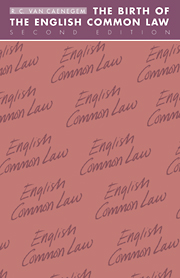4 - English law and the Continent
Published online by Cambridge University Press: 05 June 2012
Summary
‘Nolumus leges Angliae mutari’
Let us start this chapter with a paradox in spite of the fact that ‘relish for paradox has no place in sober history’. It is that English and continental law irrevocably took their different courses in the very century, the twelfth, when English civilization was closer to the Continent and less insular than at any other time. The Common Law and the ‘Romano-Germanic family’, two of the systems of universal significance analysed in David's Grands systèmes de droit contemporains, are both of European origin, yet they differ greatly. To lawyers outside Anglo-Saxon lands the traditional Common Law is well nigh incomprehensible – Bentham spoke of its ‘incognoscibility’ – because there are no codes that encompass it, a circumstance that turned away the Japanese under the great modernizer Meiji, in favour of continental codes. But Englishmen fully share this incomprehension mixed with aversion, as far as ‘the alien jungle of the Code Civil’ is concerned – I quote the phrase used by a B.B.C. correspondent, in a programme on the legal consequences of Britain joining the European Common Market.
Why is the Common Law so different from the law of the European Continent? Why above all did this national law of England enter upon its different course precisely in the twelfth century? English scholars studied then in continental universities, John of Salisbury was bishop of Chartres and Nicholas Breakspear became Pope Adrian IV, the English Church was ruled by clerics of continental extraction and very attentive to papal directives.
- Type
- Chapter
- Information
- The Birth of the English Common Law , pp. 85 - 110Publisher: Cambridge University PressPrint publication year: 1988
- 1
- Cited by



